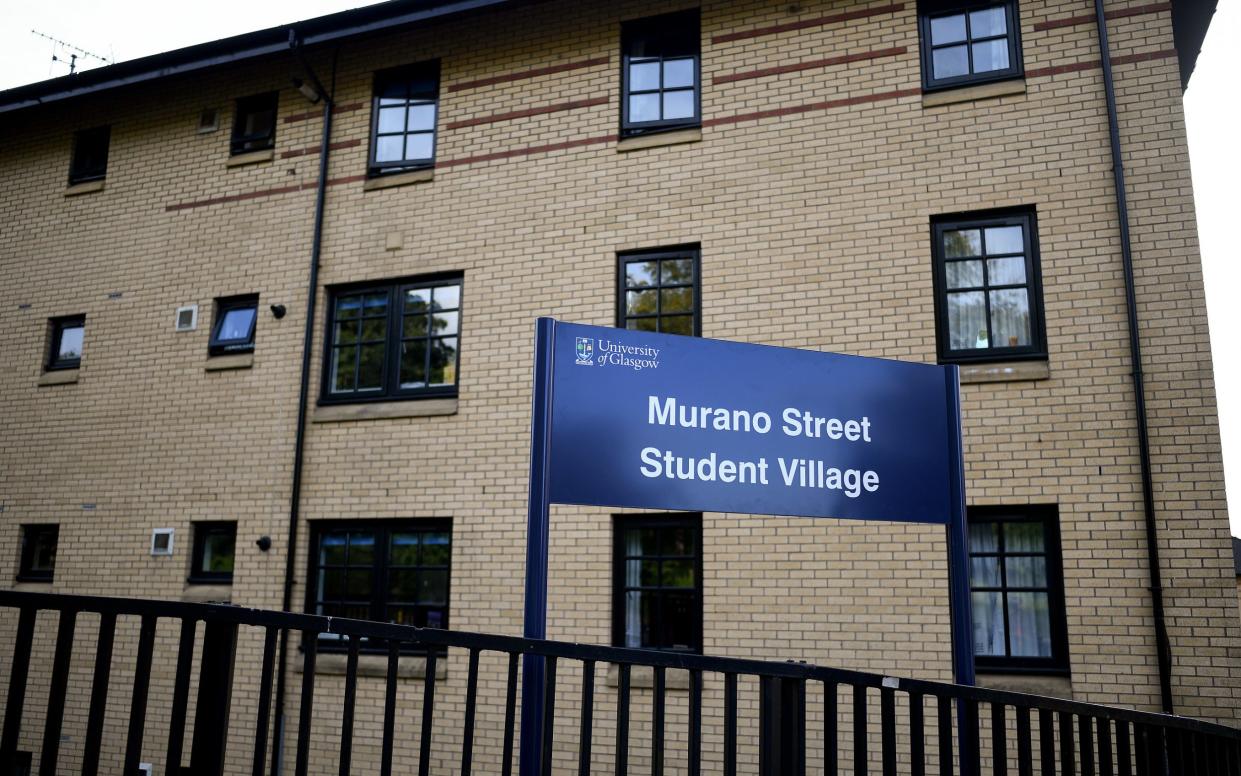The Russell Group universities charging the most for rent

Russell Group universities have increased rents at some student halls by more than £1,000 since the start of the pandemic, The Telegraph can disclose.
Students at University College London (UCL), the University of Glasgow and the University of Leeds are now paying at least £1,000 a year more for university-managed accommodation, compared to the academic year before the pandemic.
Average annual rents for student halls at those universities have risen by about a fifth between 2018-19 and 2022-23 to £9,177 at UCL, £6,125 at Glasgow and £6,335 at Leeds, Freedom of Information requests have shown.
For many students, maintenance loans have not kept pace with rising accommodation costs, putting pressure on parents to provide financial support.
Students from families with a household income of about £62,000 or more have seen annual maintenance support rise by just £470 since before the pandemic, hundreds of pounds below rent increases at Oxford, Cambridge, Exeter, Liverpool and Manchester.
For students with a household income of £45,000, annual support has risen by £725, while for those with the lowest household incomes, it has risen by £1,006.
The findings came amid evidence that students are skipping meals and considering dropping out because of the cost of living.
A survey of more than 1,000 undergraduate students for the Sutton Trust this month found that a quarter said they are less likely to finish their degree as a result of the cost of living crisis.
A quarter of middle-class students and a third of working-class students said they are skipping meals to help make ends meet.
Students are also facing steep rent increases in privately-managed student housing, which they are likely to move into for their second and third years.
Rents at private student accommodation across all Russell Group cities have increased by an average of 14.5 per cent, or £22 per week in the past four years, according to data collected by Cushman & Wakefield, the property consultancy.
Nottingham recorded the highest increase in rent for private student accommodation, rising by nearly 30 per cent over the same period.
On Tuesday, the University and College Union (UCU) announced that more than 70,000 staff across 150 institutions are planning to strike over pay and pensions for 18 days between Feb 1 and March 22.
The Telegraph analysed data on rents from Freedom of Information requests to Russell Group universities to assess average rents across all undergraduate accommodation.
Average rents for York, Exeter and the London School of Economics were calculated from individual accommodation prices. Rents at Oxford and Cambridge were averaged across individual colleges.
Russell Group universities have invested millions of pounds in additional hardship funding to support students. However, they are urging the Government to provide additional support, after it was announced that maintenance loans will only rise by 2.8 per cent next year. University halls typically include energy bills, water and Wi-Fi costs.
Additional support for students
A UCL spokesman said that the university has an access scheme which offers “additional rent support aimed at providing affordable accommodation for every student that chooses to study here”.
A University of York spokesman said: “We provide a net subsidy to student accommodation and do not generate a profit – in fact, it makes a loss, and this will be the case again this year and in future years – and we provide a variety of rooms and bursaries for students with different budgets.”
The University of Manchester said that it makes sure its lowest-priced halls “have the lowest price increases which for this year was 1.5 per cent, many times below inflation”.
The University of Cambridge said: “Colleges provide accommodation to most of their students at rents which include energy bills and other costs and are well below the market rate. Each college also provides significant tailored financial support to those most in need.”
A University of Glasgow spokesman said: “Regrettably, due to a significant contraction in the private rental market, demand for rooms continues to be substantially ahead of expectation in Glasgow.
“As part of our efforts to increase the number of rooms under university management we have bought in new beds for 2022-23 at a higher cost which we have only had since September 2022.”

Who would want to be a student now?
By Sam Hudson, 21, a history and philosophy of science student in his third year at the University of Cambridge
One of my favourite privileges I get as a writer for my student newspaper is access to the paper archives. From burlesque dancers at formal dinners to a diplomatic incident sparked by the discontinuation of a Portuguese language course, these were simpler, more carefree times.
Sure, there were still the inevitable scandals and petty debates, but these pale in comparison to what students face today.
I have not had a single term of my two-and-a-half years at university uninterrupted either by pestilence or by protest. And I’m not at all alone. Since 2018, higher education has been plagued by strikes, which only ceased during the pandemic.
I arrived at Cambridge as a natural sciences student in the autumn of 2020. Despite the fairly extraordinary conditions surrounding my matriculation, I was fairly optimistic about the year ahead of me. After all, I had been promised time and again that university would be the best years of my life. How wrong I was.
Each step back towards normalcy a small victory
Covid-19 regulations transformed student accommodation into prison complexes, with socialisation outside of prescribed “households'” of seven strictly regulated. Simply meeting new people – one of the most basic and important elements of university life – became an obstacle course zealously enforced by university staff.
Likewise, mandatory online “learning” kept students out of lecture halls, turning previously lively campuses into grey ghost towns straight from some Chernobyl docudrama set.
This social desolation had some quite obvious ramifications for student mental health, my own included.
The second year represented an improvement. But Armageddon aside, there’s little which would have made things worse. The entirely mundane, such as pubs and clubs, became excitedly celebrated novelties when they first reopened. Each step back towards normalcy was a small victory.
Unfortunately, though, we never quite got there due to cynical cost-cutting measures implemented by universities. Much teaching still remained online in my second year despite the risks posed by Covid being non-existent. And exams never returned to their original pen-to-paper format.
To make matters worse, the end of the pandemic witnessed the return of strikes, bringing yet more disruption to education. At first, support for the strikes was generally enthusiastic among the student body. But as time has gone on this support has decidedly wavered in the face of continued failure.
Inaction on the things that matter most
Despite the claims to the contrary by the increasingly out-of-touch UCU, picket lines are noticeably less enthusiastically attended by students, while criticism of the strikes online has become more common.
Ignoring these clear winds of change, student unions in most universities have stubbornly backed strikes in flagrant contradiction of their constituents’ interests. So while my third year has brought with it the end of the pandemic and its cruel hangover, strikes have persisted with vengeance.
This spring, I face losing 15 days of lectures, just over a quarter of the term, making it the most disrupted term since the pandemic. And even despite this, student unions around the country continue to offer unqualified solidarity to the UCU.
With the cost of living crisis now biting hard, there has never been a worse time to go to university than in the last five years. While student unions around the country preoccupy themselves with pet projects such as efforts to “decolonise” the curriculum, students suffer from their inaction on the things that matter most.
Both universities and the Government deserve their fair share of the respective blame for continuing with online learning long after Covid restrictions had been lifted and for placing such draconian restrictions on young people in the first place.
Yet, at the very moment when students have needed representation the most, we have suffered from an entirely dysfunctional and feeble political climate.

 Yahoo News
Yahoo News 
